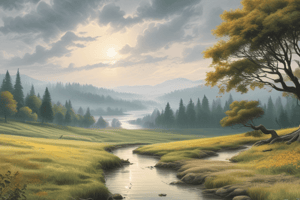Podcast
Questions and Answers
What was Robert Frost's original profession before he found his calling in poetry?
What was Robert Frost's original profession before he found his calling in poetry?
- Engineer
- Teacher
- Lawyer (correct)
- Doctor
Which region did Robert Frost settle in, providing inspiration for many of his later works?
Which region did Robert Frost settle in, providing inspiration for many of his later works?
- Midwest
- Pacific Northwest
- Southwest
- New England (correct)
What is the central theme of the poem Dust of Snow by Robert Frost?
What is the central theme of the poem Dust of Snow by Robert Frost?
- Power of human memory
- Transience of nature (correct)
- Eternal beauty of winter
- Life's fleeting joys
How many lines are there in Robert Frost's poem Dust of Snow?
How many lines are there in Robert Frost's poem Dust of Snow?
What tragic event heavily influenced Robert Frost's work?
What tragic event heavily influenced Robert Frost's work?
In what year was Dust of Snow, by Robert Frost, published?
In what year was Dust of Snow, by Robert Frost, published?
What is the primary theme emphasized by the natural imagery in the poem Dust of Snow?
What is the primary theme emphasized by the natural imagery in the poem Dust of Snow?
How does the use of a crow in the first line of the poem contribute to its meaning?
How does the use of a crow in the first line of the poem contribute to its meaning?
In comparison to Stopping By Woods on a Snowy Evening, how does Dust of Snow differ in its portrayal of solitude?
In comparison to Stopping By Woods on a Snowy Evening, how does Dust of Snow differ in its portrayal of solitude?
What is the significance of the rhetorical question posed in the final line of Dust of Snow?
What is the significance of the rhetorical question posed in the final line of Dust of Snow?
How does the contrast between darkness and light represented in Dust of Snow contribute to its overall message?
How does the contrast between darkness and light represented in Dust of Snow contribute to its overall message?
What aspect of human experience does Dust of Snow primarily emphasize?
What aspect of human experience does Dust of Snow primarily emphasize?
Flashcards are hidden until you start studying
Study Notes
Dust of Snow is a short poem written by American poet Robert Frost. Published in 1923 during his later years, this four-line verse has become one of his most well-known works. It presents themes of solitude, reflection, and the transient beauty of nature in winter. In this article, we will delve into the life of Robert Frost, examine the theme of nature through the lens of Dust of Snow, and analyze the text itself.
Robert Frost: The Poet's Background
Robert Frost was born on March 26, 1874, in San Francisco to parents who were both teachers and poets. He studied law but eventually found his calling in poetry. His life was marked by hardships, including the death of three sons from tuberculosis, which influenced much of his work. After spending some time in Great Britain, where his poems were well received, Frost returned to the United States and eventually settled in New England, a region that would provide inspiration for many of his later works.
Nature Themes in Dust of Snow
The poem Dust of Snow is often interpreted as an allegory about nature's transient beauty. It opens with the line "The way a crow" then progresses through a description of the snowflakes falling, before ending with a question: "What if you woke today should you be so taken, / And had no memories, save only the name of snow." This suggests that the speaker is reflecting on their own mortality and the fleeting nature of experience. The use of natural imagery throughout the poem emphasizes this theme, as it reflects the cycle of life and its ephemeral beauty.
In addition to these themes, scholars have also noted the similarities between Dust of Snow and other Frost works like Stopping By Woods on a Snowy Evening. Both poems deal with the idea of solitude and the human relationship with the natural world. However, where Stopping By Woods focuses more on the allure of escaping into the woods, Dust of Snow emphasizes the impermanence of even these seemingly eternal landscapes.
Analysis of Dust of Snow
The first line of the poem sets the tone with its comparison between a crow and snowflakes. Both are often associated with darkness; crows have traditionally been viewed as symbols of death, while snow can be seen as representing the end of summer and the start of winter. This contrast is reinforced by the second stanza, which describes how each flake seems like a dark dot or shadow on the white ground beneath it.
In the third stanza, the poem shifts to a more reflective tone as it asks what would happen if we were to wake up and have no memories save only that of snow. This question reflects on the transient nature of our experiences; no matter how much we may cherish them, they will eventually fade into oblivion like the snowflakes themselves. The final line then poses a rhetorical question that leaves the reader pondering their own mortality and the fleeting nature of human experience.
Conclusion
Dust of Snow is a short but powerful poem that encapsulates the themes of nature's transient beauty and the impermanence of human experience. Its evocative language and imagery have made it one of Robert Frost's most celebrated works. Through its examination of natural phenomena and the human relationship with the natural world, Dust of Snow offers a poignant reflection on the fleeting nature of life and the importance of living in the present.
Studying That Suits You
Use AI to generate personalized quizzes and flashcards to suit your learning preferences.



